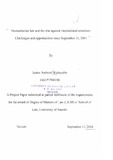| dc.description.abstract | The action by the US to invade Afghanistan and Iraq in its stated war against international
terrorism represented a great paradigm shift in the law of armed conflict. The response invoked a
confluence of legal regimes and norms in unprecedented ways. What would generally have been
thought to be the key legal issues were not, and what was never anticipated as crucial legal
concerns became so. There has been one question which has come up time after time in the
consideration of the paradox: Is the war on terrorism 'war' and, therefore, requiring military
responses or is it simply a matter for law enforcement? Before September 11, 2001, terrorism
had generally been treated as an issue for law enforcement. After September 11, 2001 the US
considered that exclusive law enforcement measures to tackle the menace of terrorism were
insufficient. It was then decided to involve the military since the general view was that the
September 11, 2001 attacks had risen beyond mere criminal conduct and were deemed to be acts
of war.
However, the articulation of the war has not been clear. If the war on terror is indeed a war as
advanced by the US, one would have expected that the application of international humanitarian
law in the process would have been automatic. In reality it has not been easy to conceptualize the
applicability of that law in this new war in contradistinction to the application of the general
human rights law, domestic legislation and international law on cooperation in criminal matters.
There is an emerging view which suggests that the USA has made terrorism an all encompassing
concept which is at times used by it to block or justify violations of human rights and
internationally recognized humanitarian standards. The US has sometimes used the idea of
national security as an excuse to justify its actions of sacrificing humanitarian values and
principles as enshrined in the United Nations Charter, international covenants on human rights
XXlll
and the Geneva Conventions for the protection war victims among other important international
instruments.
Further, it appears that the direction taken by the US in dealing with the problem has been
largely guided by national politics of hegemony. Its strategy has been bereft of objectivity and
has obscured the efforts by legal scholars and practitioners to undertake symmetrical studies to
come up with universally acceptable rules that would fully address the real problem. Such
studies would probably be able to review international humanitarian law and other rules of
international law and their relevance to the war against international terrorism or propose a new
legal framework to deal with the challenges posed by the new war. The framework could
consider issues such as the regulation of groups such as Al Qaeda and others engaged in
international terrorism and their activities. Due to the influence of the USA, there has been a glib
condemnation of terrorism without a scientific impartial study to come up with civilized means
and methods of eradicating it. The result has been a lack of clear policy within the international
community to deal with the problem with the consequence that the war against international
terrorism has been fought without known values or principles. By agreeing to sink to those
levels, the international community has in fact granted terrorists victory on a silver platter.
This paper tries to investigate the effects of politics hegemony of the US on the development and
application of international humanitarian law in the war against international terrorism since
September 11, 2001. The paper will also attempt to discuss ways in which nations of the world
can tackle the menace of international terrorism without sacrificing the internationally
recognized humanitarian standards for the protection of human life and dignity in time of
conflict. | en |

